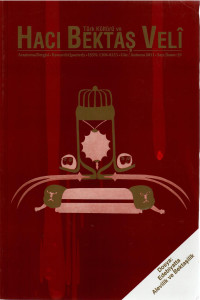Abstract
Dört kapı “şeriat, tarikat, marifet ve hakikat” kavramlarını ifade etmektedir. Şeriat, İslam dininin iman ve ibadet gibi temel esaslarını; tarikat, tasavvuf düşüncesinin sistematize edilmiş esaslarını; marifet ve hakikat ise mutlak varlık olan Allah’ı isimleri, sıfatları ve fiilleriyle tanıyıp insanın kendini Allah’ın varlığında yok etmesini içerir. Bu dört kapı dervişin tasavvufi yolculuğunu yani Allah’a ulaşarak kamil insan olma sürecini anlatır. Derviş sırasıyla bu dört kapıdan geçerek manevi yolculuğunu tamamlayacaktır. Kırk makam ise bu dört kapı içindeki zühd, tevbe, cömertlik vs. ilkeleri içerir. Derviş bu ilkelere uyduğu takdirde hakikati bulup marifete erişecektir. Bu esaslar dervişlere, kalıcı ve kolay öğrenilir olması bakımından daha çok şiirlerle anlatılmış ve böylece tasavvufi bir edebiyat oluşmuştur. Tasavvufi edebiyat ürünlerinin ortaya konmasındaki amaç okuyan ya da dinleyene tasavvufun ilkelerini öğretmek ve benimsetmektir. Tasavvufî Türk edebiyatının ilk örneklerini ortaya koyan Ahmed Yesevî, Anadolu’da gelişen tasavvufî Türk edebiyatını da etkilemiştir. Onun Fakrnâme isimli eserinde ortaya koyduğu “Dört Kapı Kırk Makam” öğretisi Yunus Emre gibi takipçileri tarafından da esas alınmıştır. XIV-XV. yüzyıllarda Yunus Emre’nin önemli bir takipçisi olan Eşrefoğlu Rûmî’nin Dîvanı’nda da “Dört Kapı Kırk Makam” öğretisinin yer aldığı tespit edilmiş ve bu yazıda örnekleriyle ortaya konmuştur.
References
- ÇELEBİ, Asaf Halet (2002): Eşrefoğlu Dîvânı, Ankara, Hece Yayınları.
- ERAYDIN, Selçuk (2008): Tasavvuf ve Tarikatlar, İstanbul, Marmara Üniversitesi İlahiyat Fakültesi Vakfı Yayınları.
- EŞREFOĞLU RUMİ : Eşrefoğlu Rûmî Dîvanı, Tercüman 1001 Temel Eser.
- GÜNEŞ, Mustafa (2006): İznikli Esrefoğlu Rumi’nin Hayatı Eserleri ve Divanı, İstanbul, Sahhaflar Kitap Sarayı.
- GÜZEL, Abdurrahman (2008): Ahmed Yesevi’nin Fakr-name’si Üzerine Bir İnceleme, Ankara, Öncü Kitap.
- HACI BEKTAŞ VELİ (2007): Makâlât, Hzl. Ali Yılmaz, Mehmet Akkuş, Ali Öztürk, Ankara, Türkiye Diyanet Vakfı Yayınları.
- -------------- (2009): Makâlât-ı Gaybiyye ve Kelimât-ı Ayniyye, Hzl.Gıyasettin Aytaş, Hacı Yılmaz, Ankara, Gazi Üniversitesi Türk Kültürü ve Hacı Bektaş-ı Velî Araştırma Merkezi Yayınları.
- İZ, Mahir (1990): Tasavvuf, İstanbul, Kitabevi Yayınları.
- KAPLAN, Doğan (2007): Erkânnâme 1, Alevi-Bektâşî Klasikleri Dizisi, Ankara, Türkiye Diyanet Vakfı Yayınları.
- KAŞANİ, Abdurrezzak (2004): Tasavvuf Sözlüğü, İstanbul, İz Yayıncılık.
- KÖPRÜLÜ, Fuad (1991): Türk Edebiyatında İlk Mutasavvıflar, Ankara, Diyanet İşleri Başkanlığı Yayınları.
- OCAK, Ahmet Yaşar (1992): “Bektaşilik”, Türkiye Diyanet Vakfı İslam Ansiklopedisi, C.5, İstanbul, Türkiye Diyanet Vakfı Yayınları.
- TATCI, Mustafa (1997-I): Yunus Emre Dîvanı I İnceleme, İstanbul, Milli Eğitim Bakanlığı Yayınları.
- -------------- (1997-II): Yunus Emre Dîvanı II Tenkitli Metin, İstanbul, Milli Eğitim Bakanlığı Yayınları.
- UÇMAN, Abdullah (1998): Dini Tasavvufi Türk Edebiyatı, Yesevilik Bilgisi, der. Mustafa İsen, Cemal Kurnaz, Mustafa Tatcı, Ankara, Ahmet Yesevi Vakfı Yayınları.
- ULUDAĞ, Süleyman (1991): Tasavvuf Terimleri Sözlüğü, İstanbul, Marifet Yayınları.
Abstract
Four Paths refer the concepts of “shariat, order of dervishes, skill and truth“. Shariat contains the basic principles of Islamic religious such as belief and worship. Order of dervishes contains the systemized thought of Sufism. Skill and truth contain the knowledge of the unique creator’s, God’s Allah , names, attributes and actions and coexistence of person himself in God’s existence. This four Paths explain the Dervishes’ sufistic travelling, i.e. explanation of the processes of being perfect person via reaching to God. Dedvishes will complete his mistic travelling through passing these four Paths, respectively. Forthy Posts contain the principles of effort, repentance, bounty etc. in these Four Paths. If Dervishes follow these principles, he will find the truth and reach religious skill. These principles have been explained to Dervishes mainly by poems, due to being permanent and easy learning, and hence a sûfîstic literature has been taken form. The aim of pointing out the Sûfîstic literature’s productions is to teach the sufistic principles to who reads or listens t them.Ahmed Yesevî, who introduced the first example of sûfîstic Turkish literature, affects the sûfîstic Turkish literature developing in Anatolia. His discipline “Four Paths Forty Posts” displayed in his work called Fakrnâme was given tongue from his followers like Yunus Emre. It was identified that the discipline “Four Paths Forty Posts” also took place in the poems of Eşrefoğlu Rûmî, an important follower of Yunus Emre in XIV-XV. centuruies, and it was displayed with samples in this article
References
- ÇELEBİ, Asaf Halet (2002): Eşrefoğlu Dîvânı, Ankara, Hece Yayınları.
- ERAYDIN, Selçuk (2008): Tasavvuf ve Tarikatlar, İstanbul, Marmara Üniversitesi İlahiyat Fakültesi Vakfı Yayınları.
- EŞREFOĞLU RUMİ : Eşrefoğlu Rûmî Dîvanı, Tercüman 1001 Temel Eser.
- GÜNEŞ, Mustafa (2006): İznikli Esrefoğlu Rumi’nin Hayatı Eserleri ve Divanı, İstanbul, Sahhaflar Kitap Sarayı.
- GÜZEL, Abdurrahman (2008): Ahmed Yesevi’nin Fakr-name’si Üzerine Bir İnceleme, Ankara, Öncü Kitap.
- HACI BEKTAŞ VELİ (2007): Makâlât, Hzl. Ali Yılmaz, Mehmet Akkuş, Ali Öztürk, Ankara, Türkiye Diyanet Vakfı Yayınları.
- -------------- (2009): Makâlât-ı Gaybiyye ve Kelimât-ı Ayniyye, Hzl.Gıyasettin Aytaş, Hacı Yılmaz, Ankara, Gazi Üniversitesi Türk Kültürü ve Hacı Bektaş-ı Velî Araştırma Merkezi Yayınları.
- İZ, Mahir (1990): Tasavvuf, İstanbul, Kitabevi Yayınları.
- KAPLAN, Doğan (2007): Erkânnâme 1, Alevi-Bektâşî Klasikleri Dizisi, Ankara, Türkiye Diyanet Vakfı Yayınları.
- KAŞANİ, Abdurrezzak (2004): Tasavvuf Sözlüğü, İstanbul, İz Yayıncılık.
- KÖPRÜLÜ, Fuad (1991): Türk Edebiyatında İlk Mutasavvıflar, Ankara, Diyanet İşleri Başkanlığı Yayınları.
- OCAK, Ahmet Yaşar (1992): “Bektaşilik”, Türkiye Diyanet Vakfı İslam Ansiklopedisi, C.5, İstanbul, Türkiye Diyanet Vakfı Yayınları.
- TATCI, Mustafa (1997-I): Yunus Emre Dîvanı I İnceleme, İstanbul, Milli Eğitim Bakanlığı Yayınları.
- -------------- (1997-II): Yunus Emre Dîvanı II Tenkitli Metin, İstanbul, Milli Eğitim Bakanlığı Yayınları.
- UÇMAN, Abdullah (1998): Dini Tasavvufi Türk Edebiyatı, Yesevilik Bilgisi, der. Mustafa İsen, Cemal Kurnaz, Mustafa Tatcı, Ankara, Ahmet Yesevi Vakfı Yayınları.
- ULUDAĞ, Süleyman (1991): Tasavvuf Terimleri Sözlüğü, İstanbul, Marifet Yayınları.
Details
| Primary Language | Turkish |
|---|---|
| Journal Section | Research Article |
| Authors | |
| Publication Date | September 4, 2011 |
| Published in Issue | Year 2011 Issue: 59 |
Bu dergide yayımlanan makaleler Creative Commons Attribution 4.0 ile lisanslanmıştır. Bu lisans, açık erişimli bir makalenin ticari olmayan bir şekilde tekrar kullanılmasına, yazar doğru atfedildiği sürece izin verir.


